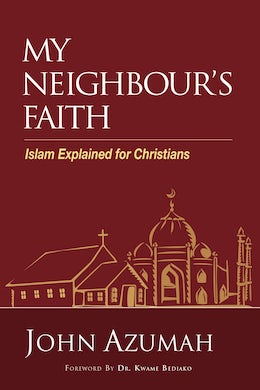How well do you know your neighbour’s faith? Well enough to discuss both your and their beliefs, comparing similarities and differences? Well enough to know the way their beliefs shape how they see the world? Can you identify how those same beliefs shape their daily lives and habits? I imagine most of us are aware our beliefs are different, but we are content with small talk about the weather or our busy week. Added to this, religion is a volatile topic. This is especially true when it comes to Islam.
Why? There are many presumptions and fears surrounding Islam. It feels as if one is walking on eggshells when engaged in conversations about it. The search for understanding and truth often results in controversy. Therefore dialogue with Muslims is daunting and complex.
This book is a compassionate response to Muslims, based on reliable evidence about their beliefs.
Enter John Azumah’s book, My Neighbour’s Faith: Islam Explained for Christians. Throughout this work, Azumah seeks to provide understanding about Islam, in the face of Western censorship and cancel culture society, particularly in the African context. He shows that Islam isn’t a detached religious institution, as many think or experience it. Rather, Islam is made up of people. Azumah gives Islam a human face: an aunt or uncle in the family; your neighbour across the street; a vendor selling bunny chows; friends at university; work colleagues; or the friendly mom at school.
Islam is Full of People Like You and Me
Though the book is scholarly, it is easy to follow, making it suitable for all types of readers. As a scholar himself, Azumah offers a faithful, detailed glimpse into Islam based on empirical, historical, and cultural evidence. Throughout his book he backs this up with reliable sources while providing commentary on the Muslim faith. Standing behind his careful and scholarly commentary is the primary intent of Azumah’s book: a compassionate response to Muslim communities, based on reliable evidence about their beliefs.

My Neighbour's Faith: Islam Explained for Christians
John Azumah
My Neighbour's Faith: Islam Explained for Christians
John Azumah
Nowhere else in the world have both Islam and Christianity been more instrumental in shaping the history of a people and their way of life than in Africa. African Muslims and Christians have a lot in common, including kinship ties, shared languages and citizenship. Yet, despite the centuries of deep historical links and harmonious existence between the two religions, new challenges threaten this harmony. Conflicts involving Christians and Muslims in places like Sudan, Nigeria and Ivory Coast are common. These conflicts are fueled primarily by ignorance, stereotyping and prejudice, which in turn breed fear, suspicion and even hatred, in some cases leading to violence. My Neighbour’s Faith sheds light on the beliefs and teaching of Islam by addressing matters of contemporary importance to Christians and the wider non-Muslim audience. It presents the human face of Islam—the face of a close relative, a neighbour, a teacher and even a head of state—in a balanced and critical way that gives a credible view of Islam.
He guides readers towards a clearer understanding and knowledge of Islam, which encourages an awareness of the people who are loyal to the religion and the influence it has on their way of life. Azumah intends for you and I to respond to his insightful observations with compassionate prayer. His insights humanise Muslims and make Islam less intimidating. He also does an excellent job of removing media stereotypes and misleading assumptions.
It is easy to dismiss Islam and dehumanise its followers, especially when there is no clear understanding of the religion, and how the West can misrepresent it. Yet My Neighbours Faith moves us to think responsively and compassionately towards Muslims. For, in the end, Islam consists of people like you and me, made in the image of God, in search of truth and meaning.
Islam consists of people like you and me, made in the image of God, in search of truth.
The Key Difference: A Gracious God
However, Muslims aren’t seeking for truth and meaning in the Creator God (Yahweh), but in Allah. Nor are they submitting to the Lord Jesus Christ, but the prophet Muhammad’s teachings. And instead of depending on God’s grace, they’re seeking his acceptance through their works and obedience.
Instead of depending on God’s grace, Muslims are seeking his acceptance through their works and obedience.
Herein lies the dire need for life-giving truth-telling, to shed light in the darkness. Every Christian has been a benefactor of hearing the truth, learning about God’s mercy. We’ve all lived in a similar predicament, until having the gospel preached to us. Recognising this moves us away from an “us and them” mentality, which only fragments society. Instead, it encourages us to establish relationships for gospel opportunities.
John Azumah’s purpose for Your Neighbour’s Faith is to present the information as truthfully as possible, while still being faithful to both the Islamic and Christian faiths.
Islam’s History is Crucial for Understanding the Faith
I enjoyed learning about the history of Islam. I was reminded that it has a starting point. Seeing the inception and progression of Islam and how embedded it is in culture and politics gave helpful insight as to why Islam is the religion it is today: diverse and divided. Islam is rife with a history of factions, power struggles, disputes over Muhammed as well as his predecessors, and ideas about certain practices not to mention culture.
Reading Azumah’s book I felt equipped to engage, encouraged rather than intimidated.
Reading through the pages of Your Neighbour’s Faith, I was surprised to find that much of Islam’s influence stems from Christianity and yet how completely different Islam is from Christianity in its core beliefs. However, Sufism and Islamic mysticism have influences from different new age-Middle Eastern mysticism and carry multiple non-Islamic ideologies. On the other hand, Christianity is based on doctrine, reasoning, and independent thinking—the pursuit of truth through knowledge, questions and reflection on the scriptures. Islam does not question. It simply believes.
Initially, I was overwhelmed by this. But later realised that each Islamic community in different geographic contexts and communities holds various facets of Islam. Thus we must prayerfully discern how to engage with these particular facets and beliefs of Islam that exist in our respective contexts. Reading Azumah’s book I felt equipped to engage, edified in my understanding, and encouraged rather than intimidated.
Azumah is a Great Guide to Your Neighbour’s Faith
John Azumah encourages us to explore Islam and helpfully brings us back to the reality of Islam in today’s society. It can feel overwhelming at first as you notice that there is so much more to Islam than meets the eye. But Azumah’s book ably guides you through this labyrinth. My Neighbour’s Faith challenged my thinking and taught me about Islam. Also, I grew a more profound understanding of my Christian faith.
Gospel proclamation occurs in the context of relationships with people of different religions.
Gospel proclamation occurs in the context of relationships, relationships with people of different religions and ways of making meaning of the world around them. Islam has much to do with me. For I am called to the great commission. God regards us as stewards of his word and gospel. Therefore, it matters what my neighbour believes. Her attitudes towards Christianity are hugely important. This book has helped me navigate those relationships and a different faith.
If you’re interested in knowing more about Islam, or you want to be equipped to have more fruitful conversations with Muslims in the community you find yourself in, I recommend this book. You stand to be equipped by the information about Islam, edified by Azumah’s insights as well as his compassion, and better prepared to engage your neighbour’s faith. I pray that your heart will grow to love and serve not only Muslims but people of all kinds and walks of life.












